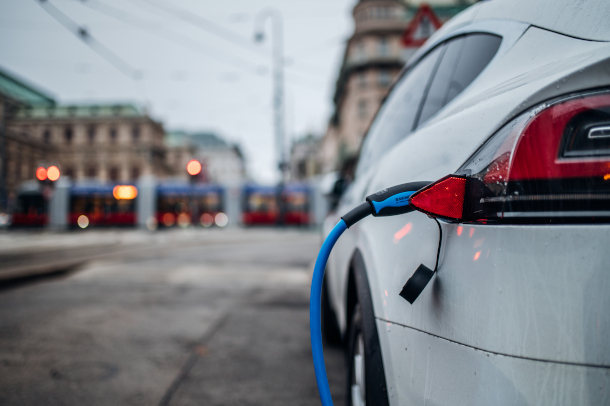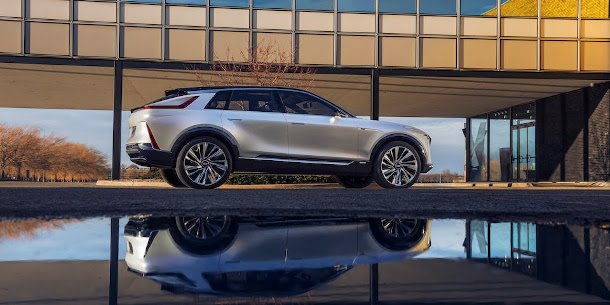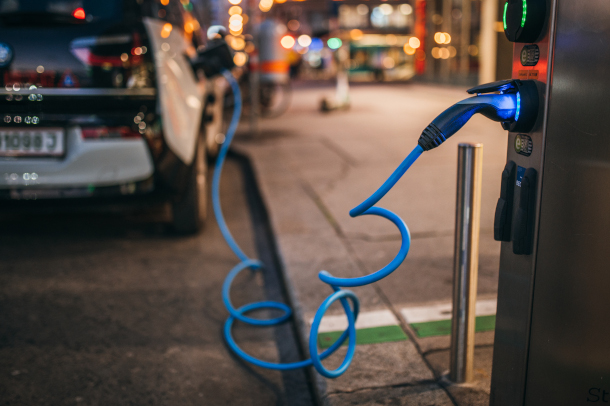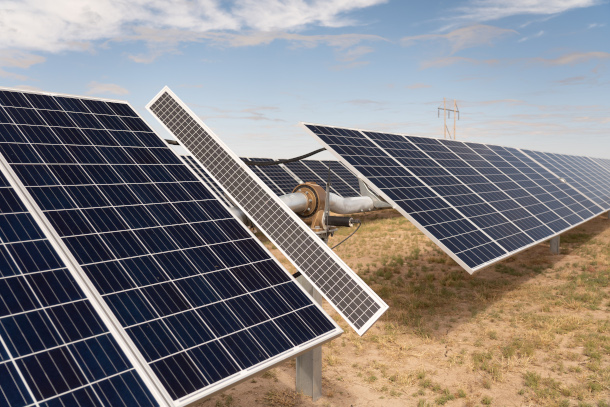GM in the EV Fast Lane
Air Date: Week of February 5, 2021

GM’s commitment to phase out internal combustion light duty vehicles by 2035 is one of the most ambitious in the auto industry (Photo: Ivan Radic, Flickr CC BY 2.0)
General Motors recently announced a bold plan to phase out gasoline-powered cars and light trucks by 2035. This move signals a major step towards decarbonizing the economy and creating thousands of green jobs and goes hand in hand with moves by the Biden Administration to incentivize EVs. Fred Krupp, president of the Environmental Defense Fund, joins Host Bobby Bascomb to discuss why GM is going all-in on an all-electric future.
Transcript
DOERING: It’s Living on Earth, I’m Jenni Doering
BASCOMB: And I’m Bobby Bascomb.
Before the break Jody Freeman told us that one of the best ways to bake in permanence with an executive order is to get buy in from industry. That way a subsequent administration would get push back from business interests if it tries to roll back policies that are working. General Motors recently announced an ambitious plan that would do exactly that. GM plans to phase out combustion engines in their light duty vehicles by 2035. And within just 3 years, by 2025, they pledged that 40 percent of their new models will be electric. That’s big news coming from the largest auto maker in the country. The plan does not yet include heavy duty box trucks and tractor trailers but their 27 billion dollar commitment to electric vehicles marks one of the most ambitious targets in the auto manufacturing industry. In the US transportation is the single largest contributor to carbon emissions so moving towards electric vehicles, powered by a clean energy grid that the Biden administration has promised, could make a huge dent in annual emissions. In the 90s General Motors famously killed the electric car, their EV1, But in 2016, 8 years after Tesla introduced its first electric car, GM came out with the popular Chevy Bolt, second only to Tesla in annual sales. GM worked with the Environmental Defense Fund to develop its electric vehicle plan. Fred Krupp, president of the EDF joins me to discuss why this is the right moment for GM to go all in on electric vehicles.

GM’s electric model for Cadillac called the Lyriq, which is scheduled to go on sale in 2022. (Photo: Courtesy of GM)
KRUPP: I think first of all, GM is a different company today than they were before they have a different leader and Mary Barra, the CEO, I think she's been making a lot of changes at GM over the years from, you know, selling Opel, their big European subsidiary that was founded in 1928, to this latest move of saying they're going all electric. So I think, you know, she is a very visionary leader, and someone who's got the courage to make big changes. The second thing that's changed though, is the world has changed. This is the future of autos, because they're just better products. They're faster to accelerate, they're more fun to drive all those people now are already buying electric cars. I wish I could tell you they're buying them to be environmentalists. No, they're behind them, because they're just great cars, less maintenance, less fuel costs. So I think GM understands this is the future. And the only question is, what are the companies who are going to prosper? And so often in business, the companies that see the way the future is going and what customers are going to want and make those changes earliest, are the companies that prosper.
BASCOMB: Now, of course, introducing an electric vehicle fleet that's charging up with electricity produced from oil and gas is, you know, somewhat pointless in terms of carbon emissions. Can you tell me though, about how this rollout might work in conjunction with plans from the Biden administration for renewable energy and EV charging stations?

This move by GM works alongside President Biden’s commitments to build more infrastructure for electric car charging (Photo: Ivan Radic, Flickr CC BY 2.0)
KRUPP: Well, you raise a really good point, Bobby, thank you for raising that. It's very important that as cars go electric that the grid becomes cleaner. And to their credit, GM has been outspoken proponent of moving the grid to zero carbon sources. And thankfully, the grid is moving that way. That needs to be accelerated. President Biden, in his campaign, had the boldest goal of any presidential candidate in our nation's history. He called for 100% clean energy by 2035. So I expect that the Biden administration will move that way, which is what is required as cars are becoming increasingly electric.
BASCOMB: Yeah, it's huge. I understand that President Biden also has a goal of half a million EV charging stations in the next 10 years and an all-electric fleet for the government. I mean, these seem to go hand in hand with what GM is planning.
KRUPP: Yes, it does. It's self-reinforcing. And it's important, the government will have to take steps to make sure that charging infrastructure is increasingly readily available, as we have more cars, we'll need more charging stations. And I expect that we'll see in the congressional legislation the Biden administration proposes in the next few weeks, we'll see money appropriated to help get those charging stations built. So that's important. But in addition, we need the government to adopt policies that under the Clean Air Act, require the automakers to clean the amount of nitrogen oxides and carbon dioxide, the greenhouse gas coming out of the tailpipes of these cars. And under the Clean Air Act, there is very clear authority for EPA, to speed this transition along. And when we do that, we will be saving lives because 1000s of people die every year because of the pollution that comes out of cars and trucks.
BASCOMB: And the Biden administration has made much of the fact that investing in renewable energy is a job creator. To what degree will this transition for GM create new jobs in electric vehicle manufacturing?

As the amount of renewable energy supplying the electric grid increases, electric cars make more of an impact on reducing overall emissions (Photo: Jonathan Cutrer, Flickr CC BY-NC 2.0)
KRUPP: Well, it'll create a tremendous amount of new jobs. You know, I might say that I've seen in some of the recent coverage of GM's move that Mary Barra is betting the company on this. I think the other way to think about it is she'd be risking the company if she didn't do this, because in many ways, it's a no brainer. Industry is going to go to the zero emitting technologies of the 21st century. And if GM isn't producing them, our country will be losing those jobs. So the real question here is how quickly does this transition occur, and which countries harvest the jobs that come with the transition? Right now, 95% of zero emitting vehicles are made in China. The US has to get better positioned and we now have GM saying they're going to invest $27 billion in electric vehicles. Industry wide, automakers will be spending more than $257 billion between 2030 developing new electric models. In the U.S., eight manufacturers have announced plans to spend $22 billion to open new or renovated plants. These are going to employ tens of thousands of people. So the U.S. has a lot to gain by having government policies that create the incentives to get our companies and our manufacturers into the business of making the cars that the whole world is moving to.
BASCOMB: And what kind of signal is this announcement sending to the market more broadly?
KRUPP: I think this is a signal that this is the future. When you see General Motors, you know, GM saying all our cars, we intend to be electric by 2035. And when you see GM saying they're investing $27 billion in this direction, this is not just a press release. This is a company that's turning around and changing direction, to move away from the internal combustion engine toward electrification. And that's really, really positive because combined with that cleaner grid, it means we can move from place to place in our comfortable cars without wrecking the atmosphere. And that's important for all of us and for our kids. And in my case, grandchildren.
BASCOMB: You sound very optimistic then looking forward.
KRUPP: I am very optimistic. First of all, President Biden is not, you know, night and day different than President Trump on environmental issues and climate. It's the difference between heaven and hell. Beyond that, you know, you have big companies making big announcements like the one GM has recently made. So I think things are moving in the right direction. It's going to still take action by Congress. It's going to take action by EPA to make sure we stay on the path and accelerate the path. But if we do this, right, we can not only reduce climate pollution, clean the air for people, make them healthier. But we can also create jobs, jobs, jobs.
BASCOMB: Fred Krupp is president of the Environmental Defense Fund. Fred, thank you so much for taking this time with me today.
KRUPP: Thanks for having me, Bobby. Much appreciated.
Links
Fred Krupp’s Statement on GM’s Announcement
Jody Freeman's NYTimes Op-Ed: "General Motors Is Counting On Your Loving Electric Cars"
Living on Earth wants to hear from you!
Living on Earth
62 Calef Highway, Suite 212
Lee, NH 03861
Telephone: 617-287-4121
E-mail: comments@loe.org
Newsletter [Click here]
Donate to Living on Earth!
Living on Earth is an independent media program and relies entirely on contributions from listeners and institutions supporting public service. Please donate now to preserve an independent environmental voice.
NewsletterLiving on Earth offers a weekly delivery of the show's rundown to your mailbox. Sign up for our newsletter today!
 Sailors For The Sea: Be the change you want to sea.
Sailors For The Sea: Be the change you want to sea.
 The Grantham Foundation for the Protection of the Environment: Committed to protecting and improving the health of the global environment.
The Grantham Foundation for the Protection of the Environment: Committed to protecting and improving the health of the global environment.
 Contribute to Living on Earth and receive, as our gift to you, an archival print of one of Mark Seth Lender's extraordinary wildlife photographs. Follow the link to see Mark's current collection of photographs.
Contribute to Living on Earth and receive, as our gift to you, an archival print of one of Mark Seth Lender's extraordinary wildlife photographs. Follow the link to see Mark's current collection of photographs.
 Buy a signed copy of Mark Seth Lender's book Smeagull the Seagull & support Living on Earth
Buy a signed copy of Mark Seth Lender's book Smeagull the Seagull & support Living on Earth

